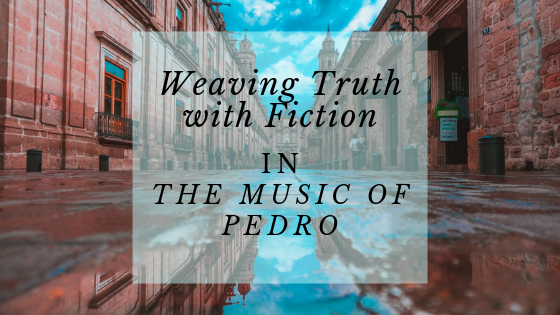
Writing The Music Of Pedro: Weaving Truth with Fiction
Stories stir in my mind like babies waiting to come out of a womb, but my poor written English held them back. I began writing my first novel, which I named Flowers for Margarita and which now bears the name The Music of Pedro, in my thirties. Now I am twice that age and am finally about to publish it, but not without the expert editing help of my daughter Reb, a writer herself and a freelance editor.
Why I chose to write in English
I initially chose to write my book in my second language not only to widen my audience and share my story with my English-speaking neighbors, but to become better with the language. I also wanted to share some details about Mexico’s involvement in WWII that many people in the U.S. aren’t familiar with. In time, I will release a Spanish translation as well.

My daughter graduated with an English degree and my writings were to her like stick figures that needed fleshing out, which she did using beautiful prose and doing necessary expounding after conscientious research, thus becoming my coauthor more than my editor.
The story is fictional but very much based on true events. It reveals much about me, my life experiences, and a wistfulness for how I wish some things could have been.
Pedro and I were both born in Pivámoc/Pihuamo

I was born in the town of Pivámoc, called thus by the natives, but now called and spelled Pihuamo. It is bathed by the Sierpe River and became a mining town after the discovery of valuable ores under the surrounding lands. Like Pivámoc in the book, it had during my childhood a wild-west atmosphere where people carried guns and had shoot outs, and it was ruled by corrupt law representatives.
Pedro, the protagonist boy in the story, was raised female for the first few years of his life. I was not, but I was influenced deeply by women all through my teens, having been raised exclusively by my mother and without a father figure for the formative years of my life. Until making significant changes in his life, my father was either absent from mine or becoming the inspiration for Francesco in his early days, the days Francesco most regrets.
Pedro and I were bullied in school
I started learning my letters in a school I called “La Escuela de Monjas,” The Nun School in my native town. From there I went to an orphanage which was run by nuns, and then to a private school where nuns were again the administrators and teachers. Finally, I was registered in a public school and my teacher there was male; however, he thought I was too girly, so he moved me to a different classroom where the teacher was a woman of past marrying age, practically a nun. There were male and female students in her class, a first for me, accustomed to attending only-boys schools. There I felt comfortable and learned how to associate in a male-female populated classroom. When in only-boys schools I was a loner, preferring solitude rather than the disturbing companionship of childish peers. I was always first of my class, thus earning the nickname “the brain.”
Pedro’s head injury really happened to me–not by a bullet but by a rock. The nuns took care of the injury and also washed and ironed my blood-stained white shirt. There was a bully in The Nun School and he did bully me, but I took care of him in a way which permanently stopped him. No, I did not kill him, but I gave him a beating which I had studied and practiced in my mind and which I executed with speed and precision. He and his friends never messed with me after that.
Pedro and I are Mestizo and loved who we were not “supposed” to
The love affair between Pedro and Margarita is a true event also, but not part of my own experience. It happened to the younger brother of my baptismal Godmother. Rosa was the name of my Madrina (Godmother). She also had a younger sister and both were of such extreme beauty that men in town worshiped them, including me in spite of my young age. Rosa’s brother was too a very good-looking man. He and a nun from The Nun School fell in love and ran away together to elope.
Being practically raised by nuns, I wanted to be a priest until I was fourteen years old, when I became deeply infatuated with a haughty girl who ignored me. She was of light skin and I am brown, being mostly descended from Mesoamerican natives. Natives and Mestizos are considered of lower caste in Mexico, and the so-called upper castes spurn them.
Pedro has opportunities I did not have
Pedro was raised without want, which is opposite of how it was for me. I didn’t know if I would have a meal the next day. I learned not to fear work out of need, and how to work from the example of my paternal grandfather, who I represent as Francesco in the story. He was an industrious man, clever and cunning as a merchant, and who really built a center of industry on his large property. He was of Spaniard descent, though not a Criollo. He fought in the Cristero War and was lucky not to be hanged by the neck until dead by the river like others did.
I love classical music and wish I could play the violin as Pedro does. I own several musical instruments: a flute, a saxophone, a clarinet, a banjo, a harmonica, and two pianos. I also tried the guitar and the accordion. I play but have never mastered any of them. But I do as Pedro.
Pedro’s mother and mine loved flowers
The use of the flower meanings in the book is due to the love my mother (to whom the book is dedicated) had for flowers. Even her maternal last name is Flores, which means flowers. And the coded use of their meanings I thought would be perfect as a secret way to communicate between a young woman meant to become a nun and a boy meant to become a priest, this in a town which teems with many varieties of flora during all seasons of the year.
My desire is that whoever reads The Music Of Pedro experiences a variety of emotions while reading it, and although it is a fictional story, I want the reader to also experience a culture which may be foreign to him or her, a culture of customs, traditions, foods, and behaviors, because the story is based on true facts, places, people, and events.




